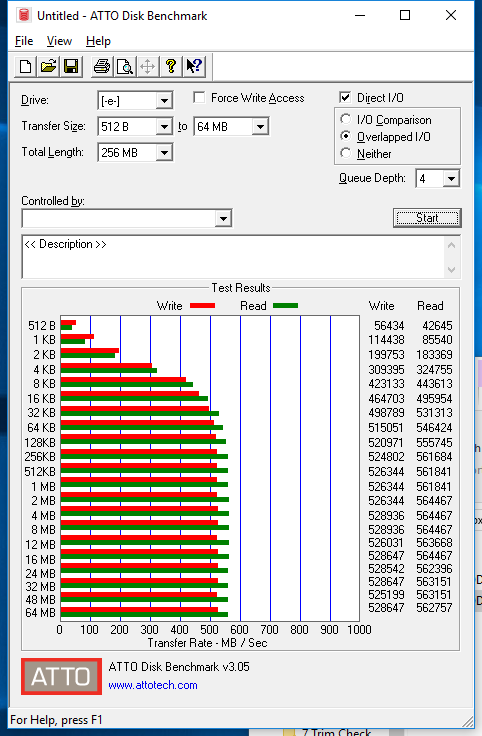ATTO Disk Benchmark is perhaps one of the oldest benchmarks going and is definitely the main staple for manufacturer performance specifications. ATTO uses RAW or compressible data and, for our benchmarks, we use a set length of 256mb and test both the read and write performance of various transfer sizes ranging from 0.5 to 8192kb. Manufacturers prefer this method of testing as it deals with raw (compressible) data rather than random (includes incompressible data) which, although more realistic, results in lower performance results.
Right off the bat, we can see that the performance of the BX300 differs from that of the SU900. The BX300 has stronger read performance as the file size increases to a max of 564MB/s read and 528MB/s write.
CRYSTAL DISK BENCHMARK VER. 5.2.1 X64
Crystal Disk Benchmark is used to measure read and write performance through sampling of random data which is, for the most part, incompressible. Performance is virtually identical, regardless of data sample so we have included only that using random data samples.
Again, we see slightly improved 4K QD1 random performance over that of the SU900 and the BX200 it replaces. Sequential performance in Crystal Disk Mark is similar to ATTO’s results, 563MB/s read and nearly 528MB/s write.
The toughest benchmark available for solid state drives is AS SSD as it relies solely on incompressible data samples when testing performance. For the most part, AS SSD tests can be considered the ‘worst case scenario’ in obtaining data transfer speeds and many enthusiasts like AS SSD for their needs. Transfer speeds are displayed on the left with IOPS results on the right.
During our AS SSD benchmarks we can see that the Crucial BX300 scored 1241 points overall. It reached nearly 530MB/s for sequential read and 494MB/s for write. 4K QD1 performance is about 34MB/s read and 131MB/s write. 4K threaded performance comes in at over 95K/87K IOPS read/write. Access times (latency results) are also very good, both read and write are under 0.030ms. Finally, during the copy bench the BX300 delivered some good numbers with two tests averaging in the mid 400MB/s range.
ANVIL STORAGE UTILITIES PROFESSIONAL
Anvil’s Storage Utilities (ASU) are the most complete test bed available for the solid state drive today. The benchmark displays test results for, not only throughput but also, IOPS and Disk Access Times. Not only does it have a preset SSD benchmark, but also, it has included such things as endurance testing and threaded I/O read, write and mixed tests, all of which are very simple to understand and use in our benchmark testing.
Anvil Storage Utilities continues to confirm the performance numbers we have been seeing in the other benchmarks we tested it with. Overall, it scored 4968 points, which is much higher than what we saw out of the ADATA SU900 and the BX200.
 The SSD Review The Worlds Dedicated SSD Education and Review Resource |
The SSD Review The Worlds Dedicated SSD Education and Review Resource | 


GREAT-With this and Toshiba 3d out there perhaps the race to the bottom is over.
If this is priced right perhaps we can say RIP planer TLC and ram-less drives.
it may be time to buy ssds again. if they start using mlc again.
This means I can ignore Intel’s Optane for a little while longer.
Curious as to what indicates this SSD uses SLC caching mode when it sports the DRAM that the SMI 2258HX normally uses as the caching element…